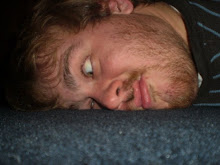It's been a really long time since I have written anything. Like, at all. I don't know if a sort of post-college burnout is to blame, or maybe just the fact that I've felt like I've had nothing to say that hasn't been said, but either way - I've had no interest or inclination to sit down and do what I'm doing now.
That changed Sunday night. I was at one of the most boring Phillies games I had ever been to, when a blurb popped up on my Twitter feed saying something to the effect of "Bin Laden killed, POTUS to hold conference." I took a gulp of Hop Devil, showed Mary and John my phone, and sat back in my chair and tried to figure out how I felt about what I had just read. Within minutes, people were buzzing all around us (a buzz that was clearly unrelated to the piss-poor offensive showing by the Phils that night), and within a few more minutes the maniacal USA chants began. By this point, I had a pretty good idea of how I felt about this new ordeal, and I figured it would inexorably lead to me sitting and typing at a computer.
The idea of nationalism is something that, for me, brings out almost every existing human emotion. I have plenty of reasons to love this country, plenty of reasons to hate it, and plenty of reasons to be totally apathetic or ignorant (or not) toward any or every party of civic, political, or social life within our society. This ambiguity is what keeps me inherently interested in people, things, and the world, and it's the mechanism that I'm able to apply when I see, hear, or experience something that I don't understand.
But the one thing that this mechanism isn't so good for is dealing with the frustration that arises from seeing people that are, for whatever reason, unwilling to embrace the idea of trying to see or experience things from varying or different perspectives, no matter what the degree. And, at it's core, this is the mantra that nationalism embodies - the idea that what is right for America is inherently right, what is wrong for America is inherently wrong, and anything that stands contrary to this is inherently an enemy that should be destroyed or, at the very least, ostracized.
I mistakenly assumed that this deranged outlook had dissipated (at least a little bit) in the 10 years since 9/11, given that the Libya bombings were met with such disapproval, and the US coverage of the Arab uprisings over the past few months were, for the most part, surprisingly (and refreshingly) lacking any illusory assertions that the US was somehow responsible for some sort of "democratic awakening." The fact that I believed this is what made the reaction to Bin Laden's death so shocking to me - Did it really only take the mysterious (and questionable) death of some tall dude with a beard 7,000 miles away to set our society's collective world view back 10 years?
I guess that will remain to be seen. Perhaps the most interesting thing about this whole ordeal will be whether or not people will totally forget about it a week from now, or if the 24 hours news cycle will drag it out as long as they can. Obviously, the former is more preferable than the latter. And plus, if people do stop talking about it within a week, it would be fun to someday say to our kids/grandkids that we lived in an era that Rebecca Black's "Friday" received more press attention than the death of an internationally sought terrorist ringleader.
